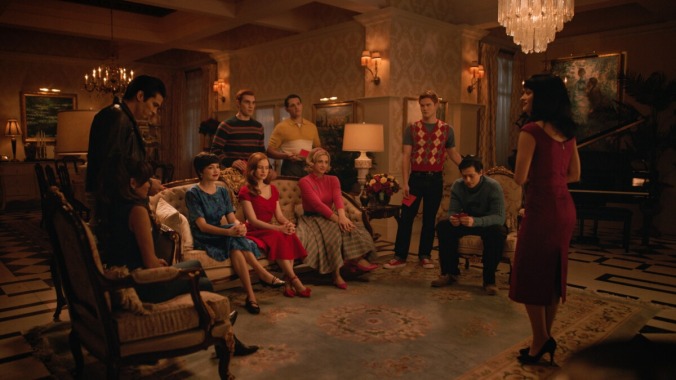L-R: Vanessa Morgan, Abby Ross, Madelaine Petsch, Lili Reinhart, Cole Sprouse, Drew Ray Tanner, KJ Apa, Casey Cott, Nicholas Baraschand Camila Mendes in Riverdale Photo: The CW
“Every season, we introduced a big bad villain,” Aguirre-Sacasa explains, citing the immortal Percival Pickens and the mortal, but equally dastardly, Hiram Lodge. “We felt that for Season 7 though, there are villainous characters for sure, but really the big bad would be the 1950s and society itself—how conformist it was, how repressive it was, how homophobic it was, how racist it was, how sexist it was.” The writers room was interested in placing Archie (KJ Apa) and the gang “in the throes of American society on the cusp of all these revolutions.”
Of course, because this is Riverdale, the premise is not so cut-and-dry as a group of teens rebelling against society. (Spoiler alert for the seventh season premiere.) According to the town’s guardian angel, Tabitha Tate (Erinn Westbrook), our heroes actually need to fight against society’s strictures in order to return the town to the 21st century, for some supernatural reason. As she tells Jughead (Cole Sprouse), it’s their imperative to make sure the arc of the multiverse “bends. Towards. Justice.”
That’s how you get a premiere that deals heavily with the murder of Emmett Till, a subject one never would have expected the CW show to tackle back in the innocent days of the first season. But as Aguirre-Sacasa puts it, “It would have been disingenuous to erase the real struggles and the real hardships that a lot of people in the 1950s faced, especially for our queer characters and our characters of color. And it felt like that would have been the wrong thing to do to pretend that none of that stuff existed.”
As a matter of fact, he argues that the 1950s high school setting allows the series to return “to the original thesis of the show, which is that the Archie Comics present in a wholesome, innocent, all American kind of way, but that there might be some darker themes and darker issues and more primal desires and impulses roiling underneath the surface.” No one does a dark underbelly like Riverdale—no doubt this season’s commentary will be as surprisingly sharp as the last.

 Keep scrolling for more great stories.
Keep scrolling for more great stories.
